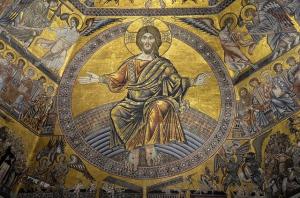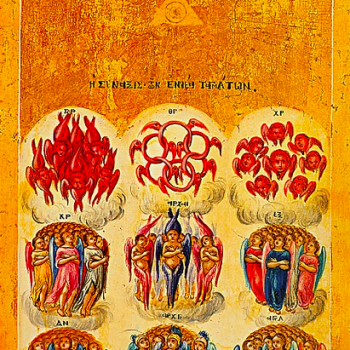Logos
In the beginning was the Word, and the Word was with God, and the Word was God. By him all things were made: without him, nothing was made that has been made.
The Word came unto his own; and his own were incapable of resisting the temptation to call things “a modern form of Gnosticism” even if they couldn’t tell a Gnostic Gospel from their own ass, as were a bunch of people who don’t even go here.

But enough about junior year of high school. Let’s talk about something that genuinely matters, like when priests annoy me on social media.
Lo-Ammi
There was a minor kerfuffle on Twitter a week or two ago. Somebody posted a selection from the Baltimore Catechism (a premier Catholic theology text for grade-schoolers in this country until shortly after the Second Vatican Council). The book states that God loves some people more than others, and—if I understood the idea at the back of all this—actually says, by way of concrete example, that God loves baptized babies more than unbaptized ones. For some reason, this made a number of people rather angry.
A number of Dominican friars stepped in to cheerfully explain that yes, “God loves some people more than others” is perfectly correct. You see, in Catholic terminology, “to love” means “to will the good of the other,” and God obviously grants some people greater gifts and graces than others. For example, it is greater to be prevented from falling into sin than to be cleansed of sin after a fall; ergo, the Immaculate Conception of Mary is an example of how God loves her more than he loves others. (I’m not clear whether this way of defining and explaining love is generally, bindingly Catholic, or if it’s more of a Thomist distinctive and/or catechetical tool. We’ll come back to that, but put it to the side for now.)
In fairness, I am not certain I followed the conversation correctly. But if I did, before long, they were trying to defend the truth and, indeed, attractiveness of the thesis that God loves baptized babies more to … people who’d had miscarriages. Meaning that God apparently did not love their babies enough to even give them a chance to be baptized.
Both Listening and Just Asking Questions
Ah, but, let them finish! God’s love comes entirely from him, you see; you can’t earn it by doing good works or by just being natively cute or anything like that! So isn’t this a comforting doctrine, actually? I mean, the only alternative to unmerited election1 is the idea that we earn God’s love, and isn’t the idea of earning love really at the core of this objection?
For anyone who’s genuinely unclear, no. No, that is not at the core of this objection! At the core of this objection is the idea that God’s love is unconditional, and ranking babies—or anybody else, actually!—in terms of “who is the most loved” is, to most people, a sick and creepy thing to do! It sounds more like Satan than God, and leaves me personally wondering what some of these friars’ mothers must have been like—not in a Sigmund Freud way, but in a Ron Howard way.

I grew up a Calvinist. I am familiar with many meticulous arguments for why statements like “God loves babies” are only Trojan horses for Pelagianism, or how awful it would be if we lived in a world where we had to “be good enough” in order to achieve God’s love. These explanations often came in to introduce, or on the heels of, explanations of why an idea that might sound horrible was, in reality, an expression of God’s love. It was occasionally also marshaled to explain why something Christians did was, in reality, an expression of their love for others. I will grant that there was some merit in their arguments, and not only grant but insist that most Reformed believers I knew were operating in complete good faith.
But eventually, I did start to wonder why love needed to spend so much time reassuring us that it even was love. No, it promised—it was love, not hatred or abuse. Definitely not hatred or abuse. Nope! No sirree. And on the other hand, I couldn’t help wondering why it was that we Calvinists seemed to spend so much time telling each other how lovely Reformed doctrine was, as if we were looking for reassurance on the topic. (One of the reasons I’ve never been entirely satisfied with Thomism is that, while distinctions between the two schools abound, I often can’t tell where it differs from Calvinism.)
Now, it’s true sin influences our judgment, so yes, love will probably need some explanation. Parents give children an age-appropriate explanation when they get their shots. But how far do we propose to stretch that analogy? How much, or how badly, does something need to hurt someone before we’re prepared to say that it isn’t love? C. S. Lewis pointed out2 that if sin has so completely corrupted our minds that, most of the time, or in the simplest cases, we can’t even correctly identify goodness, there’s nothing to prevent Christianity from becoming morally identical with the worship of Satan.
Eschew Obfuscation
“B-b-but but but St. Thomas said—”
Aaaaalrighty, Objection 1: I don’t care what St. Thomas said. And this is not because he was not personally infallible (though of course he was not), but for a quite different reason. When you get down to it, Father O.P., my problem is that you aren’t personally infallible.
It might have been more accurate and fair to say that I’ve read too many Thomists to trust for a single instant that you, a guy on social media whom I don’t know, are correctly relating what St. Thomas said about this.3 And degrees or religious titles do not automatically persuade me; I’ve read too many desperately stupid academics, and met too many thoughtless priests, to fall for that any more. I insist, instead, on intelligent answers to concrete, relevant questions about the text that’s under discussion (and you had better be able to produce a reference). What is its immediate context in the work we find it in? What is the historical context of that work? What are the real similarities and real differences between that context and ours? Are you, to the best of your ability, correcting for those differences, availing yourself of those similarities? Because, to be blunt, I am not convinced that you are.

It is easy, with a little practice, to write elaborate essays dripping with Latinate polysyllables (and I’m the last person to begrudge anybody the voluptuous indulgence of using a Latinate polysyllable). However, it’s so dreadfully easy that I’ve come to suspect many modern Thomists think that because they have remembered the terminology, they have understood it. This is not the case, as a little genuinely Thomistic reflection on the term God ought to suggest.
(All of this said—I have to confess, I was not only less than civil, which can sometimes be defensible, but, in at least one case, I feel I was less than fair to one of the friars who got involved in the kerfuffle, and being unfair is really not defensible. Fr. Peter Totleben O.P., if you’re reading this, I dare say my other thoughts on the topic are clear enough, but I’d like to add to them that I’m sorry for addressing you as hastily and harshly as I did. You didn’t deserve to be the specific priest I took out my frustrations on.)
At the Feet in the Mouths of the Doctors
Let’s return to that definition that’s the ostensible basis of the argument: To love is to will the good of the other. That seems to me like a good definition of charity (i.e. caritas, divine love, unconditional love), at the least a good jumping-off point. Well, doesn’t it follow logically from that definition that, if God wills a greater good to John than he does to Judas, he loves John more?
No, Socrates. It does not. And I’ll tell you why.
Incidentally, this is a perfect illustration of something St. Thomas was very good at, which his disciples often fail to imitate: sometimes you need to plod through the steps of an argument, very slowly and boringly, in order to get the correct answer. The problem here lies in the deceitfully simple words “greater” and “more.” They’re deceitful because they are comparatives; their meaning is entirely context-dependent. If you don’t look at the facts they apply to first, you’re just playing a word game.

Say I have two cups of coffee in front of me. Both are filled to the brim: one is a twelve-ounce cup, the other a sixteen. Which of the cups is more full? The correct answer is “Neither,” because they’re equally full—even though the contextual meaning of “fullness” for the sixteen-ounce cup is, quantifiably, more than the meaning of the same word in the same circumstances for the twelve-ounce cup.
In much the same way, when we’re speaking about God’s love for man, to say he bestows a “greater” good on this person than on that one does not entail the consequence that he loves this person “more.” I’m not altogether sure what “loving more” would even mean as applied to God. Being infinite, he does not need to ration his attention in the name of saving time, nor to rank his affections in order to ensure he isn’t overextending himself.4 That too suggests the problem with this “loving John more than Judas” language: it makes God sound like a parent openly ranking their favorite child against the others. That isn’t how love behaves! Or maybe that way of putting things was a great catechetical tool when it was originally devised, but has since lost its power, as the nuances of the expression have run into other channels.
Many Mansions
What is true—and what, I have a hunch, is at least partly what the language of “willing a greater good” and so on was designed to get at—is that God loves us particularly; he loves the specific creation he made in us. This isn’t an anonymous “Oh, it’s one of those things I decided I’d love—yes, very well, come along child, I mean my dear child.” And when you love someone, you love them, not an idealization of their potentialities.
I think a better way to describe God’s love for humanity is that it’s like a mosaic.

Pictured: me thinking of God’s love for humanity like a mosaic
The idea of a mosaic is that you have anywhere from hundreds to billions of little pieces of stone, metal, and glass with which to make a picture. Let’s say you want to make a portrait of Thanos eating a rotisserie chicken.5 Perhaps you have a small piece, just the one, of genuine garnet that you’re going to use for the Reality Stone, which is obviously going to be the symbolic centerpiece of the mosaic, sitting just where the chicken’s eye ought to be; you also have a far larger number of small pieces of dull, purplish-grey river stone, which will do perfectly for Thanos’s skin.
Now, the beauty of the garnet is greater than that of the river stones, or at any rate it is if you share the majority taste. But would the mosaic be improved, would it be a better portrait, if you replaced all the river stones with garnets? Of course not—it wouldn’t even be a mosaic anymore, just a vague mass of (quite pretty) fractured garnet, with nary an alien supervillain or fowl carcass in sight.
And not only would the beauty of the portrait as a whole be diminished, the supposedly lesser stones would lose their significance too. The particular thing they contribute to the whole would turn into a flat mass, making them really far more unimportant than they were when they were dull purplish-grey river stones. It isn’t loving the river stones less than the garnet that leads to them being what and where they are: loving them just as much as the garnet is exactly what puts each stone in its own perfect place.

Why Only I Am Allowed to Say the Word “Gnostic”
The problem that gave rise to the horrible and ridiculous (though mercifully short-lived) discourse is a fairly common one among religious people. At any rate, I can say from observation that it’s common among evangelicals, and also among trad-leaning Catholics, whether they lean far enough to fall off the Barque of Peter or not.
That problem is a failure to grasp the reason why using the right words is important; which is, incidentally, also the reason why using the right words is not important. It’s a reason with roots right down in what words essentially are: they’re tools, tools for conveying meaning. The purpose of a tool is to fulfill a function: a hammer exists for hammering, pliers for plying, Phillips head screwdrivers for inconveniencing people, etc.
Think for a few moments, now, about the relation between tools and their functions. The tool was designed for its function; it is not an arbitrary or optional thing. Yet at the same time, if you’re without the tool in question for whatever reason, and are smart or lucky, you may be able to MacGyver up a substitute. Because of course the main point here is to get the job done that the tool exists for, not to just kinda have the tool on the grounds that it’s a neat collector’s item.
Self-styled theological conservatives in this country, Catholic and Protestant alike, tend to pride themselves on their dedication to orthodoxy. No one enunciates terms like consubstantial with more vigor and precision. But I think they have lost touch with the connection between meaning and word that such terms exist for; it is becoming a mere magic word, an intellectual superstition.

A selection from a late Yuan dynasty Chinese silk painting, depicting the cosmology
of the Manichees, a particularly successful and long-lived Gnostic church.
And with that attitude, there really is a (distant and accidental) kinship with Gnosticism: one of the practices shared by several Gnostic sects was the transmission of spells and words of power. According to their various doctrines, after death, the soul would attempt to ascend from earth to heaven, and it could use these secret passwords to force aside the hostile angels that inhabited the planets, trying to bar their way and trap them in the terrestrial realm. I’ll be the first to admit that this is an extremely cool video game; but that isn’t what orthodoxy is for. That isn’t what words like ὁμοούσιον and Θεοτόκος6 do, or were ever intended for.
The sole point of all the dogmatic definitions and formulæ is to convey the Thing Itself. Reciting magical formulæ will not secure passage to “that Rome where Christ himself is Roman.” Only a real, live grasp of It can do that. And if that Thing was content to describe Its immutable self as repenting, or St. Thomas could sing of the blessed sin and necessary fault of Adam, then we should be prepared to do the same when the occasion calls for it.
Footnotes
1Election in this context means “choice,” and has no reference to voting or politics in general; this meaning is now a little archaic, but remains standard in several traditions of Christian theology.
2I think this came up somewhere in Miracles; he says something similar in XXI of Letters to Malcolm.
3If you would like me personally to have a little more confidence in what Dominicans say, purely on the strength of your being Dominicans, I should advise you to begin by gently suggesting to Fr. Thomas Crean that flirting with geocentrism is Not A Good Look.
4Obviously, St. Paul (quoting from the prophets, no less) uses precisely this sort of language in Romans 9-11, so there is Biblical precedent for it. However, it doesn’t follow that the language means the same thing either in the prophets or in St. Paul that it does for Thomists; and, if I’m correctly informed, Romans 9-11 is one of the most notoriously difficult passages in the New Testament.
5I don’t have to explain myself to you.
6ὁμοούσιον (homoousion): “one in being, consubstantial”; Θεοτόκος (Theotokos): “God-bearer, Mother of God.”












